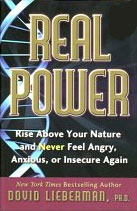 Identifying as a Jew
Identifying as a Jew


4 min read
Don't get angry. Why let someone else dictate how you feel?
When someone is rude to us our first reaction is to protect our ego. We get upset and respond with something like, "How dare you talk to me like that!" "Don't you yell at me!" We make this angry person our problem.
Why let someone else dictate how you feel? Getting angry gives another person control over your emotional state. That's a lot of power for one person to possess, especially someone that is rude to you.
If you resist your initial inclination to get defensive, you may be surprised at what happens. Instead of, "Why are you treating me like this?" try saying, "You seem to be having a rough day." Rather than, "I didn't do anything. Don't talk to me like that!" say, "This seems to have upset you." Don't take possession of his problem. It's his problem, not yours.
The psychological dynamics change dramatically as soon as you use the word "I" or "me." Then it becomes something between you and him. By using the word "you," you keep the ball in his court and the problem remains his sole property.
It has nothing to do with you as long as you don't try to take part ownership of it.
You will find that by not responding defensively you won't become as upset by the exchange. It has nothing to do with you as long as you don't try to take part ownership of it.
Sometimes criticism comes in the form of nicely packaged advice. In this instance thank the person for offering her insight, and then later you can decide whether or not there is any credence to what she said. Sometimes it can be hard to separate out the message from the messenger, but when you do, you may find some good advice.
Thank the person regardless of how unproductive or self-serving the remark is. Recognize that if the advice is more of a put-down than it is constructive, she is coming from a place of pain and she needs to do this in order to feel good about herself. Have compassion and empathy for her and rise above it. If you get angry or annoyed, it's the same as kicking the shins of a 90-year-old man who wants to pick a fight with you. First, no matter what happens, you can't win. And second, what are you doing? Do not get defensive. Do not engage her. Simply say "Thank you, I will give that some thought," sincerely and directly.
If you want, you can then ask a question regarding how or why she herself is so capable, without being sarcastic!
Comment: "You know, Aaron, you were way off your game in that meeting."
Response: "Really? I'll have to review that later. You're so great for looking out for me. How would you have handled it?"
Comment: "Marcy, you know that outfit is not very flattering on you."
Response: "Oh, thanks for letting me know. A lot of friends wouldn't tell me something like that because they'd think I might get upset. You're such a special person. Where did you get such a great sense of fashion from?"
Comment: "I thought you were trying to lose weight. Do you think you should be eating that?"
Response: "Oh, you're so sweet for remembering that I'm dieting. Thank you. You seem like you have great willpower. I'd love for you to tell me your secret."
This person is being disrespectful to you because she craves respect herself. By thanking her and asking her for her input, you feed her psyche and end the "attack."
Of course, not all criticism comes from people in pain. And just because it's not done in a caring way does not mean that this person doesn't still care about you. She may not be able to critique you effectively and kindly, even though she does really care.
Alas, we should always keep in mind the optimum motivation for holding our tongue. The Talmud (Gittin 56a) reveals that the strength of God is manifest through His non-reaction to the insults and blaspheming of the wicked. Elsewhere, the Midrash states that one who is silent in the face of insults is called pious, and a partner with God. What greater motivation do we really need?
So the next time someone fires an insult or criticism your way, remember you don't lose by saying nothing in response.
 Real Power offers specific strategies that will enable readers to harness untapped abilities and experience immediate and dramatic change. Click here to purchase.
Real Power offers specific strategies that will enable readers to harness untapped abilities and experience immediate and dramatic change. Click here to purchase.
